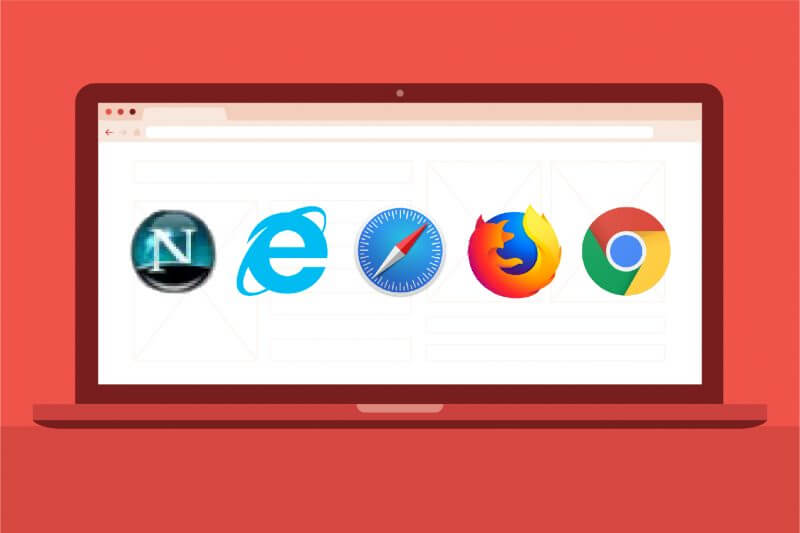3 July 2018
Is it time to assess your website?
Read More

You’ve probably never given much thought about the web browser you use when using the web, and why should you? Well, if you’ve decided to read this blog, you’re probably considering a website build with us or maybe you’re just curious about how browsers impact your experience of the web.
Just like most technology, there’s a confusingly large number of browsers to choose from; all providing the same service, but all doing it in their own unique way. By the end of this blog, you’ll hopefully understand a bit more about the browsers we choose to support and the reasons behind our choices.
Firstly, before we look at the reasons for supporting certain browsers, a quick lesson in what a browser is. A web browser is a software application that allows you to view web pages and access information across the web. The first browser, called “World Wide Web”, was created in 1990 and it didn’t take long for others to follow. By 1994, “Mosaic” and “Netscape Navigator” had been released and in 1995, Microsoft released the first version of a browser (which you may have actually heard of) called “Internet Explorer”.
Most modern browsers are predictable in their behaviour and a web page will look and behave consistently across them. This is in part due to the fact that there are organisations that create standards for the browser developers to adhere to. The time it takes for browser developers to bring their browser up to these standards can differ greatly. This combined with the fact that browser developers will not alter their old (not supported) browser versions to meet these standards means that if you view the same web page in a few different browsers, it is possible that it will look or behave differently in each one.
As with any technology, browsers are constantly improving. As browsers evolve, they offer greater support for new coding standards and methods that have been developed. Although these improvements might not always be obvious to the end user, they can often make a big difference for developers. These improvements and support for new coding standards can mean they have to write less code and their code is more manageable and lightweight.
Anyway, enough about how it makes developers lives easier, what does this mean for you? These changes can lead to an improvement in performance, reducing the amount of computing power needed to browse the web and reducing the load times of websites. They bring with them new functionality and mean websites can become more powerful in terms of the functionality they provide; as well as allowing greater possibilities with the design of the site.
Not everything you see on the web can work in all browsers, due to the browser limitations and the advancements in web technologies since that browser was released. An example of this is modern web-based online gaming. Some older browsers simply don’t have the power needed to render the games like modern browsers and some are unable to read the code used to create the games.
Security is paramount for websites, especially those who handle sensitive data. It seems that every other month another large company is victim to a security breach through their website and you can imagine the damage this does to their reputation and business as a whole. One reason some browsers are left behind and new versions are released is due to security issues. If a security vulnerability is found in a browser, it’s developer will often address this issue, but only on the browser versions, it is actively supporting. This means if a security vulnerability is found on an older/unsupported version, it will not be fixed and using that browser can make you vulnerable.
As you now know, not all browsers offer the same support for code; so an identical web page may not look the same in different browsers, as one browser may not be able to read/interpret certain code. In a lot of cases, it is possible to write code or add code to make the web page look and behave consistently across browsers. This does, however, add time and complexity to creating the website and becomes harder and more time consuming with the more browsers you support.
We aim for our websites to work on as many devices and browsers as possible, but we can’t support them all. Although the browsers we support can differ on a website by website basis, a good way for us to choose which browsers to support is to look at their usage figures. If we’re building a website that will be used exclusively on a mobile device, we don’t have to worry about supporting desktop exclusive browsers (even though most will naturally be supported). Below is a list of the most popular browsers and their global usage percentage.
Google Chrome holds the majority of the market share, helped massively by Chrome for Android which accounts for 52% of its usage.
Safari’s usage figures are helped by its IOS (mobile) usage, which accounts for 43% of its usage.
Firefox is a great browser but has a relatively small usage when compared to Google Chrome and Safari.
Quite the change from 2004 where IE was used by 88.9%.
Edge took over from Internet Explorer in 2015 and although it is considerably better than Internet Explorer, it still has a smaller usage.
The remaining market share is made up of browsers such as Opera and browsers only available in certain countries, as well as device-specific browsers like browsers on smart TV’s.
Usage statistics sourced from:
IE 11+
Safari 10.1+
Firefox (current)
Chrome (current)
iOS 9+
‘Browsers we support’ updated July 2018
Why not email hello@little.agency or call 0113 828 0000 to find out how we can help you to transform your content marketing.


Still the same great data driven services, but now with a different name